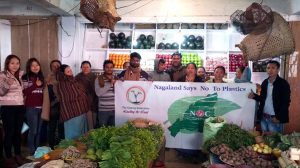Nagaland
Plastic-free Nagaland? 90% shoppers still use plastic bags

Dimapur, Jan. 12 (EMN): With an aim to create awareness on the ill-effect of plastic items among the business establishments, Kohima-based non profit organisation The Coming Generation (TCG) organised a plastic-free campaign for the shopkeepers in the state capital city.
It was found out during the awareness programme organised under ‘Nagaland For Change,’ an initiative of ‘Nagaland Says No to Plastic,’ 90 percent of shoppers still use plastic bags despite the call from the government to give up single-use plastic items. The organisation said in a statement that awareness and ‘effective implementation of legislation’ may help in reducing the usage of plastic bags in the state.
Several campaigns against the use of plastics have been organised across the state after the Nationalist Democratic Progressive Party (NDPP)-led People’s Democratic Alliance (PDA) government announced during the World Environment Day in 2018 that the state would ban single-use plastic items.
The Coming Generation said that its members visited various locations in Kohima, including BOC, High School and Main town to spread the need to ban plastics among the shopkeepers by shifting to other alternatives like bags made of newspaper, cloth and crafted paper. It said few people were still reluctant to give up single-use plastic bags but the response was good.
Plastic bags are popular because of its light weight, resistance to degradation, durability and low cost but the harm it brings to the society can be colossal as it takes 15 to 1000 years to biodegrade, thus posing risk to human health and environment, said the statement.
Using plastic bags in packing hot edible items leads to migration of harmful chemicals to food item which causes diabetes, and harm the heart and liver, it added.

